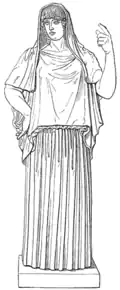Hestia
See also: Héstia and Hestią
English

Hestia
Etymology
From Ancient Greek Ἑστία (Hestía), from ἑστία (hestía, “hearth”).
Pronunciation
- IPA(key): /ˈhɛsti.ə/
Proper noun
Hestia
Translations
Greek goddess
|
Asteroid
|
Further reading
Catalan
Etymology
From Ancient Greek Ἑστία (Hestía).
Further reading
 Hestia on the Catalan Wikipedia.Wikipedia ca
Hestia on the Catalan Wikipedia.Wikipedia ca
French
Etymology
From Ancient Greek Ἑστία (Hestía).
Pronunciation
- IPA(key): /ɛs.tja/
Further reading
 Hestia on the French Wikipedia.Wikipedia fr
Hestia on the French Wikipedia.Wikipedia fr
Polish
Etymology
Borrowed from Ancient Greek Ἑστία (Hestía), from ἑστία (hestía, “hearth”).
Pronunciation
- IPA(key): /ˈxɛs.tja/
Audio (file) - Rhymes: -ɛstja
- Syllabification: Hes‧tia
Declension
Declension of Hestia
| singular | |
|---|---|
| nominative | Hestia |
| genitive | Hestii |
| dative | Hestii |
| accusative | Hestię |
| instrumental | Hestią |
| locative | Hestii |
| vocative | Hestio |
Further reading
- Hestia in Polish dictionaries at PWN
Spanish
Etymology
Borrowed from Ancient Greek Ἑστία (Hestía).
Pronunciation
- IPA(key): /ˈestja/ [ˈes.t̪ja]
- Rhymes: -estja
- Syllabification: Hes‧tia
Swedish
Etymology
Ultimately from Ancient Greek Ἑστία (Hestía), from ἑστία (hestía, “hearth”).
This article is issued from Wiktionary. The text is licensed under Creative Commons - Attribution - Sharealike. Additional terms may apply for the media files.